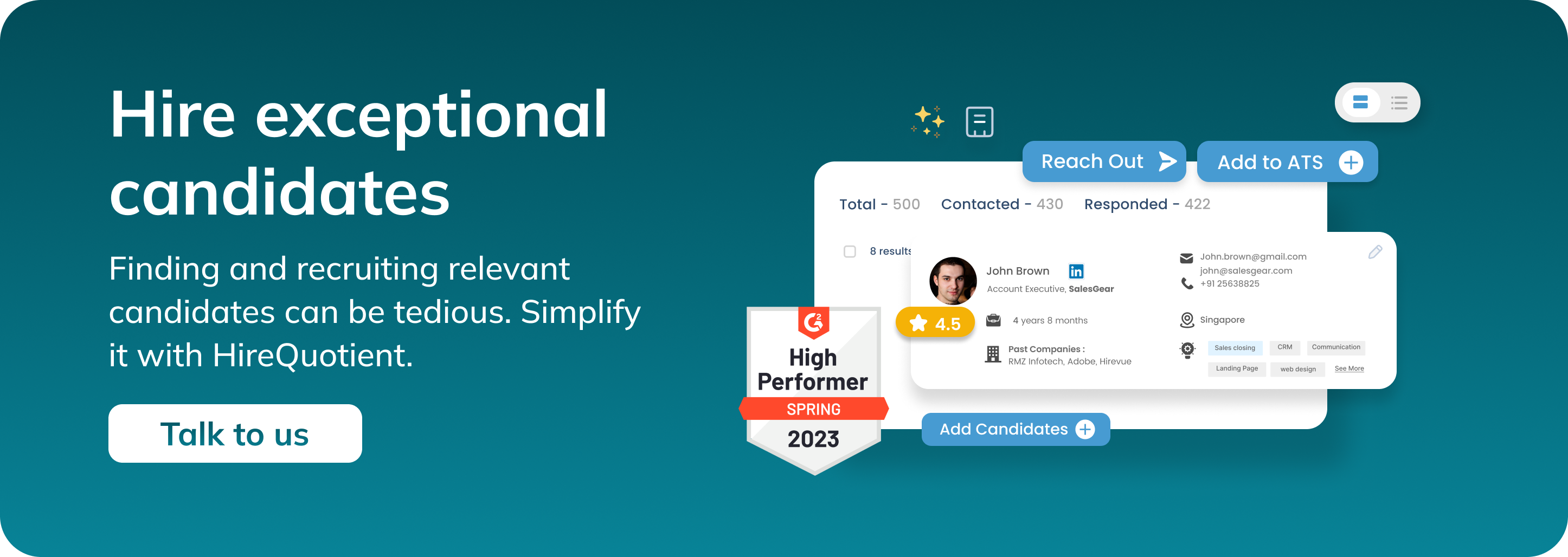What is The Difference Between Talent Acquisition And Recruitment?
Published on June 5th, 2023
When it comes to hiring, there are two terms that often get used interchangeably - talent acquisition and recruitment. However, they are not the same thing. Understanding the difference between them is critical to building and maintaining an effective hiring strategy. In this blog post, we will define both terms, explore their key differences, and provide tips on why and how to leverage them effectively.
To start, talent acquisition is a strategy to identify, attract, and retain the best talent for the organization. It is a long-term process concerned with building relationships with potential candidates, and fostering them into a workforce that will help drive the company’s goals. Essentially, talent is the focus of acquisition, and the aim is to continuously enhance the overall competency level of the workforce. It involves prioritizing the company’s future requirements and mapping out how those needs align with the organization’s mission, culture, and values.
On the other hand, recruitment is more focused on filling a specific job opening. The recruiters' primary goal is to identify candidates with the right skills and qualifications to match the requirements of the job description. They determine the basic prerequisites, attract the relevant talent, and move them through the hiring pipeline. Mcq of open or targeted job requisitions often drives recruitment, and most companies leverage internal recruiters, headhunters, or agencies to manage this process.
Another significant difference between the two is the approach to networking. The Talent Acquisition team seeks to establish a robust, extensive network of high-performing candidates to leverage as interim or future openings arise. Recruitment, conversely, is typically reactive; recruiters use posting methods and reach out to potential candidates on an immediate need-basis.
Talent Acquisition requires a more extensive and nuanced approach regarding salary negotiation, research, and designing competitive employee packages that go beyond the employee’s primary role. Companies invest in benefits, growth opportunities and high-quality employee support to amplify their talent engagement and retention.
Recruitment focuses on motivation; the recruitment layer will pay attention to designing talent can incentive for potential candidates, such as bonuses or relocation packages.
Aspect | Talent Acquisition | Recruitment |
|---|---|---|
| Focus | Long-term strategy to attract and retain top talent | Immediate filling of specific job openings |
| Objective | Build relationships with potential candidates | Identify candidates with skills for job description |
| Duration | Ongoing process | Typically shorter-term process |
| Networking Approach | Establish a broad network of high-performing candidates | Reactive outreach to fill immediate needs |
| Responsibility | Often handled by dedicated talent acquisition teams | Managed by internal recruiters, headhunters, or agencies |
| Scope | Comprehensive approach considering future requirements | Targeted approach based on current job openings |
| Focus on Compensation and Benefits | Emphasizes holistic employee packages beyond salary | May focus more on salary and immediate incentives |
| Strategic Alignment | Aligns with long-term organizational goals | Addresses immediate staffing needs |
| Emphasis on Engagement and Retention | Prioritizes fostering relationships and employee engagement | Focused on filling positions quickly and efficiently |
| Approach to Talent Pool | Aims to build and maintain a talent pipeline for future needs | Focuses on finding suitable candidates for existing positions |
| Examples | Proactive sourcing, employer branding initiatives | Job postings, candidate outreach, resume screening |
Why EasySource is a Game-changing Tool?
EasySource revolutionizes talent sourcing by being the world's first completely automated tool designed to simplify the search for top talent. Recruiters can effortlessly build a robust talent pipeline with just a few clicks, thanks to EasySource's advanced AI-based filters including location, skills, education, experience, and US work authorization. This groundbreaking tool makes finding relevant candidates easier than ever before.
In addition to its impressive features, EasySource integrates ChatGPT and Generative AI, empowering recruiters to send highly personalized messages to candidates across various platforms, all with the convenience of automation. With EasySource, recruiters can amplify their LinkedIn searches, effortlessly discover and engage with potential candidates, and bid farewell to the tedious task of sifting through countless resumes to uncover exceptional talent.
Conclusion
Talent acquisition and recruitment are both essential components of the hiring process, but they aren’t the same thing. Talent acquisition has a bigger picture outlook on building dynamic, diverse workforces that support an organization’s long-term goals. Recruitment is a more tactical approach that fills immediate staffing needs. Understanding their differences will help you to evaluate and leverage them effectively to build a workforce that drives results, leads innovation, and fosters growth.
Authors

Radhika Sarraf
Radhika Sarraf is a content specialist and a woman of many passions who currently works at HireQuotient, a leading recruitment SaaS company. She is a versatile writer with experience in creating compelling articles, blogs, social media posts, and marketing collaterals.

Hire the best without stress
Ask us how
Never Miss The Updates
We cover all recruitment, talent analytics, L&D, DEI, pre-employment, candidate screening, and hiring tools. Join our force & subscribe now!
Stay On Top Of Everything In HR
